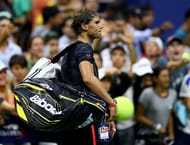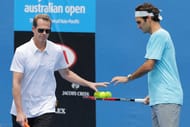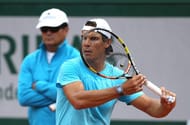In every athlete’s career, there comes a time when everything seems to be going against them. No matter how hard one works, no matter how confident one is, no matter how dominating their position might be, some way or the other they end up on the losing side. These are the tough times. These are the times which either make you or break you.These are the times which promote you from good to great. Those who understand this principle have their names written in the history books forever.
Rafael Nadal is going through a tough time in his career. The King of Clay is now just a shadow of his former self. It is evident that he has been struggling to win matches. The same ball which used to obey his commands obediently now floats around the court on its own will. The same Rafa who used to be a serious contender for the highest echelons in tennis, the Grand Slams, is now struggling to reach even the quarter-finals stage.
It is painful for every tennis fan to see their great champion fading away. Every great athlete has to hang up their boots one day. This is the universal truth, but nobody would want it to end this way.
Tennis is one of the loneliest sports. You are all alone on the court with more than a thousand pairs of eyeballs fixed upon you, noticing every single move you make. Your opponent can read your thoughts. All your vulnerabilities are exposed and guess what, there is nobody to blame when you lose. You have to take it all on yourself. To deal with such immense pressure players often develop their own rituals and habits to focus better. These rituals help them feel more relaxed, more comfortable and that they are in command.
Nadal too has his own set of rituals. But almost strangely it seems that Rafa relies on these rituals way more than he probably should. For instance, if you move his meticulously placed water bottles even by an inch, he will lose all his focus and might as well go on to lose the game.
In his autobiography, Nadal mentioned that he is afraid of darkness and likes to sleep with lights on. An absolute warrior on court, off-court he is very dependent on his family and friends for everything. All this worked well till past one year or so but now his inability to adapt to change and make decisions has started affecting his on-court performances.
To see this principle in practice, one does not have to go too far. Nadal’s arch-rival, Roger Federer has implemented this philosophy beautifully. Federer is 34 and is still playing supreme tennis.
It is his ability to adapt to change and to alter his tactics according to the situation which allows him to play highest level of tennis even at this age. Federer added the great Stefan Edberg to his coaching team, a change which has worked out in amazing ways. Federer now plays a much more attacking game.
He comes onto the net more often and his volleys have improved, producing magical glimpses of vintage Stefan volleys. Last year he started using the racquet with a bigger head which has helped him a lot in his backhand shots.
Just last month, the tennis world saw Federer invent a new shot, the SABR ( Sneaky Attack By Roger ). Federer is not afraid of changing his game. He sees it as a challenge and loves it.
Nadal needs a similar approach to ameliorate the condition of his tennis. The change need not be the same as Federer but his own adaptation of it. At first, it would feel very strange to see Nadal change his style of play.
We have seen Nadal use the same technique to wear out his opponents for years. But the time has come for Rafa to have a new strategic approach which will be friendlier to his body and more effective on court. In my opinion, he needs to attack more. He can no longer chase down every single ball every single time. Rafa needs to step up, stay closer to the baseline and attack the ball. He must take his chances.
Rafa needs to redevelop that fear in his enemy’s eyes when he steps onto the court. He must attack the ball from the word go and thrash his opponent with his heavy pounded forehands. In last few years, youngsters have started believing they can beat Rafa.
An apt example of this is a string of his performances at Wimbledon in last 4 years. In 2012 Nadal lost to Rosol, ranked 100 in the world. In 2013 to Darcis, a journeyman ranked 135, then to the teenager Kyrgios (144) the following year and now to Brown (102) in 2015. The Spaniard needs to recreate his dominant performances and get the control back in his hands.
To do this, Nadal needs a new coach. Period. Yes, Toni Nadal has been with his nephew ever since he started playing tennis but after a certain point in their career, an athlete needs new tactics and new outlook on the matches. And for this he needs a new coach. ‘Rafa’ should not remove uncle Toni from the team completely as he relies a lot on uncle Toni emotionally. All I am suggesting is that, Rafa should have a senior coach.
Just like Federer trains with both Severin Luthi and Stefan Edberg, Nadal can train with both uncle Toni and a new head coach. This will allow him to have a new game plan, a new style of playing – and eventually give him a new life in the tennis world.
Change has to meet the future today, because tomorrow might be too late.
Who Are Roger Federer's Kids? Know All About Federer's Twins


